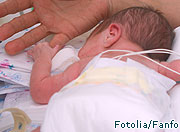Almost a thousand Scots babies are suffering from potentially fatal brain and organ damage because mothers are drinking too much in the early stages of pregnancy, research has revealed.
Many more babies in Scotland may also face a lifetime suffering from malformations or learning difficulties.
Researchers say the effects of excessive drinking on unborn babies are largely being ignored and the Alcohol Bill currently going through the Scottish Parliament needs to address this issue.
Avoidable
Women who binge drink in the first three months of pregnancy can cause Foetal Alcohol Syndrome (FAS) or the less obvious Foetal Alcohol Spectrum Disorder (FASD). Researchers say both are completely incurable and entirely avoidable.
Dr Jonathan Sher, director of research, policy and programmes at Children in Scotland, said: “Foetal alcohol syndrome is the proverbial tip of the iceberg. It is easier to diagnose because the damage can be seen.
“Thousands more children, teenagers and adults across Scotland have suffered serious harm to their brains that is invisible, but continues to have a negative impact on their learning, behaviour, wellbeing and life chances.”
Damaged
The research, submitted to the House of Commons Health Committee, states: “A conservative estimate is that there are 900 children in Scotland who have FAS – and many times more children and young people who were damaged in more subtle, but still serious, ways by foetal alcohol exposure.”
Dr Brian Keighley, chairman of the British Medical Association in Scotland, said: “We need to raise awareness of the emerging evidence on FASD among healthcare professionals so that children are diagnosed quickly and get the help they need. The lack of awareness and research in the UK on this subject, together with the complexity of the syndrome itself is leading to delays in diagnosis and referral.
“Healthcare professionals also need to get the message across to expectant mothers that consuming alcohol can cause irreversible harm to their unborn child. It’s about giving people the right information so that they can act responsibly — and save children from completely preventable life-long disabilities.”
Shocking
Dr Richard Simpson, Scottish Labour Health spokesman, said: “The conclusions of this report are shocking. Children’s charities are absolutely right to highlight the impact of alcohol abuse on unborn children and raise awareness about the dangers of alcohol consumption in pregnancy.
“I believe that expectant mothers should be given much clearer advice, but we also need to deal with problem drinking at an earlier stage.
“The truth is that too many young women, and young men, are drinking excessively.”
The report comes as children’s charities in Scotland back Scottish Government plans for minimum pricing on alcohol.
Preventable
Forrester Cockburn, Emeritus Professor of Child Health at Glasgow University, told The Herald newspaper that far more children in Scotland are suffering from the syndrome “than were ever damaged by thalidomide”.
“The commonest preventable cause of Attention Deficit Hyperactivity Disorder (ADHD), autism and congenital heart disease is Foetal Alcohol Syndrome,” he said.
“You may see these conditions as a result of other problems but this is the one thing which is entirely preventable and young women should be made aware of that.
“For the first three months I would not recommend any drinking, but one or two units a week after that might be okay. This is nine months of a woman’s life whereas the outlook for the child is for life.”
Pricing
Prof Cockburn believes imposing a minimum price on alcohol and clearly labelling its harmful effects would help.
Dr Harry Burns, Scotland’s Chief Medical Officer, said recently that prenatal exposure to alcohol “is the leading cause of brain damage and developmental delay among children in industrialised countries”.
Last week a consortium of children’s charities in Scotland, including NSPCC’s ChildLine service in Scotland, urged the Government to put “children’s interests at the heart of alcohol policy”.

